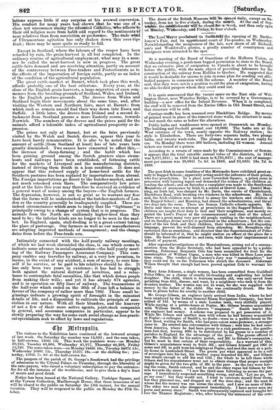Except in Scotland, where the labours of the reaper have
been retarded by rain, the grain-harvest is all but completed. In the ordinary routine of agricultural employment, what may in a man- ner be called the meat-harvest is now in progress. The great cattle-fairs demand and are receiving attention, partly on account of the controversy between Free-traders and Protectionists as to the effects of the importation of foreign cattle, partly as an index of the condition of the agricultural population.
' The great cattle-market at Barnet, which took place this week, affords probably one of the best criterions. Every year, at the dose of the English grain-harvests, a large migration of oxen com- mences from the breeding-grounds of Scotland, Wales, and Ireland, to the English pasture-grounds. The droves from Wales and Scotland begin their movements about the same time, and, after 'visiting the Western and Northern fairs, meet at Barnet; from which such as remain unsold find their way down into Essex and Suffolk. A. little later, the droves from Ireland and a second de- tachment from Scotland pursue a mere Easterly course, towards Norwich. The numbers of the droves and the prices paid for the animals afford a tolerable index of agricultural prosperity or de- pression.
The prices not only at Barnet, but at the fairs previously visited by the Welsh and Scotch drovers, appear this year to have been barely remunerative. It is also to be noted that the amount of cattle (from Scotland at least) has of late years been greatly diminished. Two causes have concurred to effect this,— the increase of sheep-farming ; and the habit .which has been gaining ground among the Scotch graziers since steam- boats and railways have been established, of fattening cattle for the markets of Liverpool and the manufacturing districts, instead of driving them South in a lean condition. It does mot appear that this reduced supply of home-bred cattle for the Southern pastures has been replaced by importations from abroad. The Foreign importations go direct to the butcher-market, and are not much esteemed even there. The comparatively low prices paid at the fairs this year may therefore be received as evidence of a general want of money among the buyers—the English farmers. The depression, however, is not so great as to warrant any fear that the farms will be understocked or the butcher-markets of Lon- don or the country generally be inadequately supplied. These are indeed circumstances which seem to imply that the " tightness " is principally owing to a change of system that is in progress. The annuals from the North are nuiformily higher-bred than they used to be ; the inferior kinds are no longer to be seen in the mar- ket. In England, again, stall-feeding is to a great extent taking the place of pasturage. Our farmers as well as our manufacturers are adopting improved methods of management; and the change dates from before the Free-trade iera.


























 Previous page
Previous page